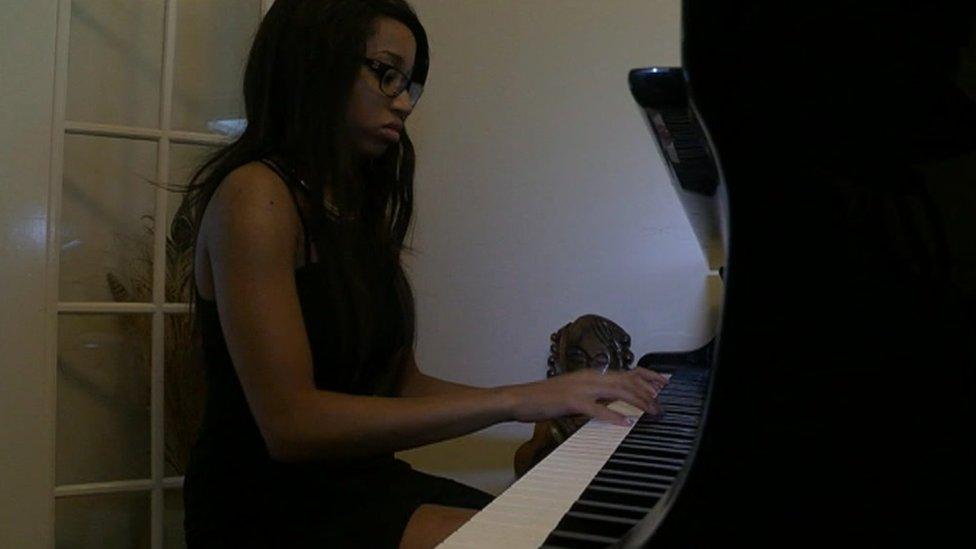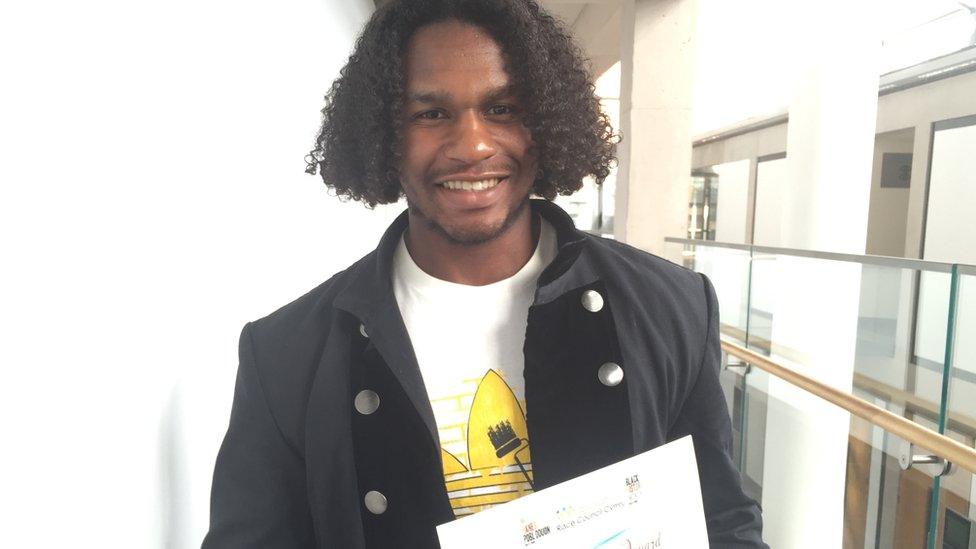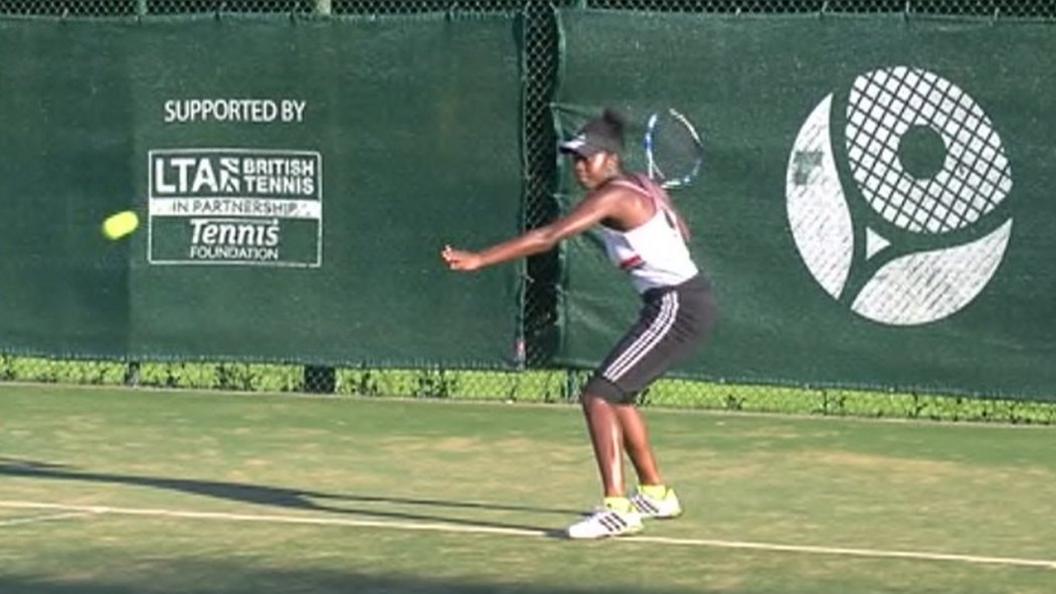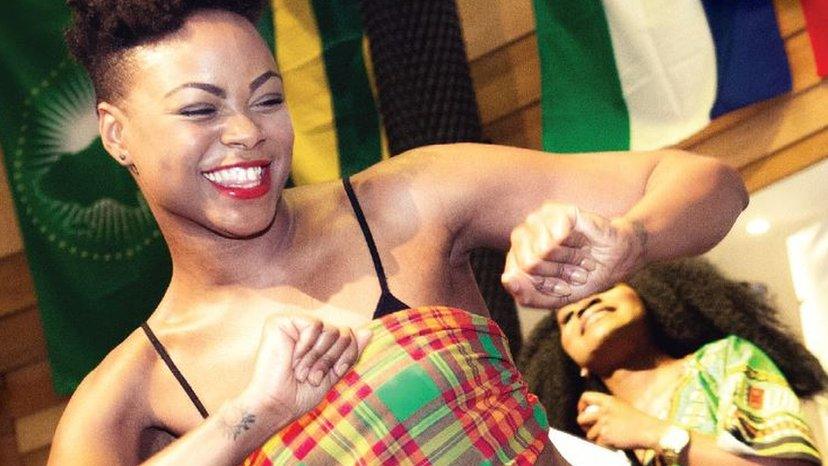Former asylum seeker tennis player wins Black History award
- Published
Kimberly Mpukusa says she has struggled to get to where she is
A former asylum seeker who was coached by her father has won a sport award as part of Black History Month.
Kimberly Mpukusa, 18, became the number one Welsh under 18s tennis player despite struggling to find a sponsor.
Contributions made by black people to history and culture will be celebrated throughout October.
The event's first youth awards, Young Gifted and Black, for people aged between 13 and 30, took place in Cardiff on Thursday.
Ms Mpukusa, from Swansea, started playing tennis aged nine on a school trip, and her dad picked up the sport and read books in order to help her. She struggled to compete in tournaments due to her financial situation.
She stopped playing at age 13 because of her asylum case, but returned to the sport two years ago when her family was granted an indefinite stay.
She started that year as the 123rd best player and has now returned to the number-one spot.
Ms Mpukusa : "It really means a lot to me, words can't explain how much my parents have struggled and how much that I've struggled.
"This award, I can show people that if you work hard, if you're determined, if you sacrifice, you can become big and people can recognise how hard you work."

Ify Iwobi, who won the music category, has composed 28 original pieces
Ify Iwobi from Swansea battled obsessive compulsive disorder, (OCD) to win the music award.
She said: "When I was young, especially when I was a baby, I used to tinker up to the toy pianos that we had in the house and I used to just experiment with the keys and just tap along and make different sounds with my baby hands.
"My friends were like 'she's drawn to the piano, there's something that she's drawn to with the piano so we need to get this talent honed'. So when I was a bit older, from six, I started classical piano lessons.
"It hasn't been easy expressing my music especially, with the OCD... that includes disturbing thoughts, memories from the past which weren't that pleasant, basically they would disrupt what goes on from day-to-day living.
"That would get in the way of me and my personal practice on the piano, waste a lot of time and energy.
"I had to have lots of therapy, I had to go to lots of counselling and they gave me ways to think positively."
Roselynn Mbwembwe, 15, a dancer from Swansea, won the award for the performing arts. She has been dancing since she was eight-years-old and had won over 25 awards in dance, including Welsh dancer of the year.
She said the award is not just for her "but for other children like me too".

Christopher Nation has cared for his mother since he was six
Christopher Nation, 19, from Fairwater in Cardiff, picked up the young carer award. His family is originally from Jamaica and he has been looking after his mother since he was six.
"It's important for us to know our history. It's easy for us to get caught up in the way that the west is and forget about our own culture and things like that," he said.
More than 100 people attended the event in the Senedd.

Other Young, Gifted and Black winners include:
Performing Arts: Roselynn Mbwembwe for dancing
Entrepreneur: Nancy Buka who set up a hair and beauty salon
Young Leader: Ali Abdi for living-wage campaigns
Good Citizen: Jacob Ofruma for fundraising and volunteering
Volunteering: Ismat Ayed for community development in Butetown
Science and innovation: Taiwo Okeneye for developing an African recipe app and other IT work

The origins of Black History Month go back to 1926 in America, and there are now more than 6,000 events across the UK.
Ray Singh, chairman of Race Council Cymru who judged the awards, said: "These young people have so much to offer our society and many have already made some rich contributions as carers, community leaders, musicians and volunteers.
"Their impact is already visible in the fields of science and innovation, citizenship and performing arts.
"Now, post-Brexit, it is about looking forward and ensuring that Wales is a nation where black history, arts and cultural differences can be the subject of celebration and not division."
- Published30 September 2016

- Published30 September 2016
